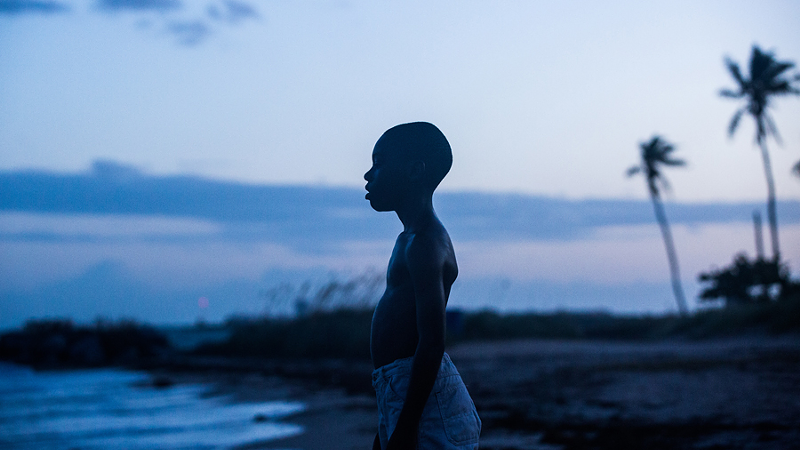As a young boy, Chiron, initially identified as “Little” (Alex Hibbert), grows up in the ’hood in Miami, Fla., existentially separate from the other black boys around him, yet practically entrenched in the daily realities of the soulless world they share. Bullied and constantly on the run, he flees his peers as well as the spiraling, downward trajectory of his life at home, where his single mother (Naomie Harris) teeters on the verge of surrendering to drug addiction. These are the baseline notes, the foundation of a sad refrain that assumes a measure of resigned acceptance in the face of futility.
But all is not lost.
We spy Little on an afternoon when he flees, breathlessly entering an abandoned hotel that now serves as a crack den. There he encounters Juan (Mahershala Ali), a drug dealer who cajoles him out of his routine despair into something that resembles the glow of the moon in the night sky. Juan feeds Little, then takes him to his house where his girlfriend Teresa (Janelle Monáe) coaxes him to open up a bit, cracking the boy’s tough shell. He subsequently returns to the pair, seeking the measure of solace they provide, although he comes to appreciate that Juan is also the cause of his mother’s struggles.
By the second verse, Chiron (Ashton Sanders) is now a teenager. Juan is dead and gone, but Teresa remains a steadfast presence, maternal and giving in all the ways a boy like Chiron needs. Earlier, he had asked Juan and Teresa about homosexuality — specifically, about being labeled a “faggot” — and now that note takes center stage. In search of identity, he latches on to his friend Kevin (Jharrel Jerome). Chiron, in no time, experiences love, followed by pain and an eruption of his own explosive frustration. If Moonlight was a murder ballad, what Jenkins gives us here is Chiron as a victim.
In the final verse, Chiron gets reborn as the young man called “Black” (Trevante Rhodes), the nickname bestowed on him by the teenage Kevin, who has now grown into a real man (André Holland), a prison-educated line cook with a child of his own and a tiny apartment, who is somehow free and content at being nothing more than who he is. He becomes a lifeline and example to Black, who still has struggles ahead.
Black cruises through the streets of Atlanta (in a tricked-out ride that recalls Juan’s), a place he fled after serving time in juvie, and plays tough with his drug crew. But when he receives calls from his mother and Kevin, he awakens to a new set of possibilities. Before long, Black takes off for Florida, where he confronts an uncertain future.
The metaphoric Blues of Moonlight starts with the repeating or laying out of Chiron’s life in each verse. Through him, Jenkins charts an intimate portrait of the plight of young African-American men. But as he seems to descend further into this societal pit, one that must certainly end with him in the mass-incarceration system, a spark of hope emerges. While there is nothing overtly religious about this, the willing can appreciate the nod to the influence of spirituals in the African-American tradition of the Blues.
Of course, in the end, such tales (or songs) of those caught between the flesh and the spirit come down to a tempting embrace and merger of the two sides. And in each of Moonlight’s verses, Jenkins captures the moody and expressive sensuality of Chiron’s coming of age. As he traverses the dangerous path from boyhood to manhood, we live in his skin and enjoy his dawning lust for the fullness of a life not promised to him, but that he’s working to earn. (Opens Friday at Esquire Theatre) (R) Grade: A
CONTACT TT STERN-ENZI: [email protected]


